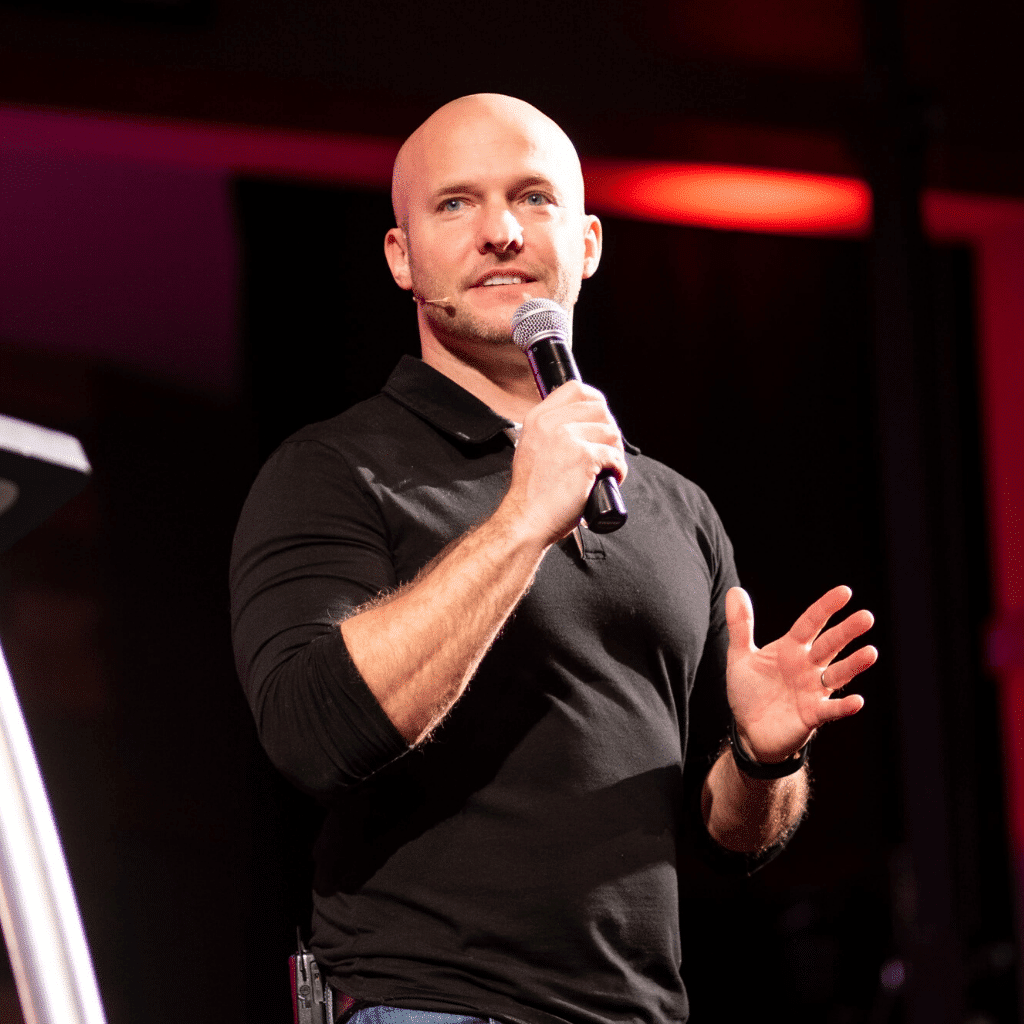How to Catch ‘People Problems’ Before They Surprise You

Listen to the Bible Leadership Podcast on: Apple Podcasts | Google Play | iHeart Radio | Spotify | Stitcher | TuneIn
Leaders can get into all kinds of trouble if they don’t boldly deal with problems that are undermining their effectiveness. In this episode, you’ll learn three essential strategies for staying ahead of people and situations that could undermine your leadership success.
Podcast Transcription
How to Catch “People Problems” Before They Surprise You [Transcribed]
Pastor Carter:
What up everybody! Welcome to the Bible leadership podcast where we always want to connect your Bible to your leadership and your leadership to the Bible.
My name is Pastor Mark Carter and today I want to talk to you about three things that even great leaders get wrong. Thank you so much for joining us. Your time was important me, I want to make sure that I add value. So let’s just go ahead and get started.
You know, these three things that even great leaders get wrong all have to do with confronting difficult people or situations before they grow into a larger problem than they already are. And to do this we’re going to look at David’s relationship with his son Absalom. I think everyone would agree that David was a tremendous leader, he was an awesome strategist. And yet there were some things on the home front that he really didn’t do, right. And so there’s plenty for us to learn about leading, not just families, but our teams and organizations.
Let’s jump right in. And we’ll start with Proverbs 22:3. “A prudent person foresees danger and takes precautions, the simpleton goes blindly on and suffers the consequences.” Man, we don’t want to suffer any consequences. Now, I don’t think that if we are Christians that we should walk around feeling worried and anxious and fretting about everything. But I also think that the Lord doesn’t want us to be naive. And that’s why he warns us in Proverbs 22:3.
Here’s the problem, whether you’re a parent, or a manager, or whatever it is, you influence, we all get into trouble when we don’t boldly deal with problems that are undermining our effectiveness or the effectiveness of the organization. And when we don’t deal with things, you know, we have anxiety of knowing that the problem’s there, it’s kind of festering, it’s on the back burner. It’s an app that’s still running, even though we don’t want to look at it. And it’s also in many cases causing problems itself. The problem is creating more problems. Maybe that’s gossip, maybe it’s disunity. Maybe it is just lack of cohesiveness in the team. But either way, we want to get our minds around this.
So you guys know the story. David had multiple sons, multiple daughters. We get the sense though, that he was an absentee father. One day his son Amnon became infatuated with his half sister Tamar. He ends up raping her and then decides that he hates her and tells her to get out. Her full brother Absalom hears about this. Now it seems like maybe he gave it a little bit to see if the king would do anything about it. But then he takes matters into his own hands. Because he murdered his brother.
David has a predicament. He has a son that has murdered another son. He should bring consequences. He should you know, as the King, as the father, he should bring order back to his family and ultimately his failure to do so, in a certain sense, I know that there’s a prophetic thing happening here — the fulfillment of prophecy as punishment for David’s sin — but there’s also just a natural reality that it led to Absalom overthrowing and deposing his father only temporarily, but it still was a major problem that he had to deal with.
So the question we’re asking today is from a leadership perspective, what did David do wrong? We’re going to talk about how to catch people problems before they surprise us. So here’s number one, he didn’t deal with the issue when it first appeared. He didn’t deal with the issue when it first appeared. I think that we all can be in the habit of doing this from time to time, but this book of 2 Samuel 13:21 says that when Dave King David heard about what happened, he was very angry. But that’s all he was, like, that was it. He didn’t do anything else.
You know, Absalom never spoke to Amnon. He hated him. And he was, you know, slowly simmering because of what happened to Tamar. But David keeps leaning away from dealing with a very serious situation. Man, dude, his daughter was raped by one of his sons, like, Man, you should do something about that. Yeah, be angry. But you know, it’s a little bit confusing for us because we see David, and he was angry with Goliath. And he leaned in man, he took that dude down, and yet he couldn’t do anything when it came to his own family. He should have punished him.
This was his first opportunity to like stop this right here. He should have brought about just consequences. But for David, it was easier to just do nothing. He didn’t act. He didn’t confront. He didn’t pray. He didn’t lead Amnon toward repentance. He didn’t try to bring about reconciliation between the two. He didn’t bring any kind of justice. And what happens is, because he doesn’t do that, Absalom begins to simmer. And he begins to slowly boil and realize that his father is weak, at least in his mind. He’s not standing up for justice, and a stronger leader is needed because my old man isn’t going to do anything.
Well, you know, we’re probably not in that situation. But I think all of us know that sometimes we’re just like, Man, I’m too busy to go deal with that thing. You know, I hear that there are some rumblings you know, somebody’s mad at me or for some issue that, you know, maybe I need to go apologize for but, hey, I’m busy. You know, I’m a leader and I gotta get stuff done. Well, you know, my friend, leaders are busy, but the enemy is going to always give us a lot of reasons that we shouldn’t immediately jump on stuff but we should. Especially, dude, if you know the enemy doesn’t want you to do something. You should do it, obviously, because tangents are going to continue to grow if we don’t jump on them.
So what happens? Well, Absalom’s men, you know, get talked into it by Absalom. They murder his brother. It’s a horrific event for the entire family. And again, David does nothing. He doesn’t bring any kind of punishment to Absalom. He doesn’t just sit him down and be like, hey man, you were right to want justice, but you can’t just kill your brother. Like, this isn’t okay. We’ve got to do something now. We’ve got to bring some kind of a response to this. Maybe David would include like a restoration plan, but something has to happen.
We’ve got to be quick to deal with issues. As soon as the Holy Spirit nudges us, unlike David, we need to do something. We, yes maybe take a second, you know, get clarity, get prayer about it, but in case it’s something, we need to go find out. Years ago, I was at a conference and Jud Wilhite was preaching and he said that as soon as he hears about an issue, he calls that person. Now Jud Wilhite is, you know, a tremendous pastor of a tremendous church, but I just thought it was inspiring that, you know, he didn’t wait 10 minutes. He didn’t wait two weeks. He said, “Oh, somebody’s got an issue. Well, it’s not going to get any better by ignoring it. I’m just gonna immediately call up and deal with it.”
So what do we learn from David? Well, he didn’t deal with an issue when it first appeared. And then number two, he led passive aggressively. So with regard to his son, he withheld his relational privileges. He led passive aggressively. You know, when we’re passive aggressive, we’re pretending that things are good even though they’re not. So David causes some relational distance. Even though he wanted to be reunited with his son, he was still conflicted. 2 Samuel 14:39 says, “and King David now reconciled Amnon’s death.” So like, okay, he’s put it behind him. He longed to be reunited with his son Absalom. But then in 14:24, it says, “Hey, Absalom, may go to his own house, but he may never come into my presence.” So Absalom did not see the king.
So we see this happen with even us sometimes. Like, yes, I want to be with this person, I want to comfort this person, and yet I’m mad at them. And, you know, they can they can go do their fulfill their responsibility, but they can’t see me. I’m withholding relationship. That’s our punishment. And that’s just what passive aggressiveness does to a tee. Man, it’s like a snake in the grass. It doesn’t tell you that it’s against you. Instead, it’s trying to manipulate a situation by not communicating. Sometimes we give people the silent treatment. Maybe sometimes they’re being huffy, or sassy. Or they’re just, you know, they’re curt in an inappropriate way because they’re subtly trying to hurt us, but they don’t really want to come out and say it.
Absalom’s allowed to return. He is allowed to come back from exile, but he’s not allowed to have relational privileges with his father. And this is David’s fault. You know, this is the opposite of what Jesus does. He not only forgives us, he dives right in relational. He reassures us of His love. And he says, ‘here’s what we’re going to do, we’re going to go work on these things. You’re going to do it in my strength, and I’m going to be there with you to complete it. And in the meantime, you still get access to my presence. We’re still going to be together.’ You know, Jesus didn’t beat around the bush. He confronted Peter. When it’s time for Peter to be restored, he said, ‘Peter, look, here’s the lesson, man. And here’s what I need you to do. And I’m not gonna say something different than what is actually true. This is the situation and this is what we need to solve.’
So, if you are a leader, first, we need to lead with questions. We need to, you know, be humble and ask, hey, what am I not understanding here? We need to be patient. We need to get clarity. But we need to provide consequences when consequences are necessary. When you say, here’s what we’re doing, here’s what you can do, and here’s what you can’t do. If they can’t do what you need them to do without being passive aggressive, I mean, I think we need to ask the question, ‘is this really the person that I want on my team’ because teams don’t go well when someone is refusing to not be passive aggressive.
So what do we know? Number one, David didn’t deal with the issue when it first appeared. Number two, he led passive aggressively. Well I think that leads us to the question, was there a way that he could have caught it early? I don’t know if there was for David, but there is for us. So number three is, he wasn’t counting on the enemy attacking from within. He really wasn’t paying attention to potential threats from the inside. David was a great warrior. I’m sure he was paying attention to the outside. Hey man, what nations, you know, might rise up against us? But he wasn’t paying attention to his own kids. He wasn’t paying attention to someone of his own family. And that’s where the enemy sometimes gets us, with people that are close to us.
So for four years, Absalom is out in front of the city gates, and he’s actually talking to people into, hey, you know, I’d be a great king. If someone would give me a shot, I’d bring justice. King David will never do it. But I’ll do it. And it just leaves me wondering, dude, where, how did David not know about this for four years, as Absalom is standing at the gates stealing the hearts of his people. He’s underestimating a potential enemy. But he didn’t even have any like, friends that would say, just so you know man, your son’s out there really making a ruckus, kind of tearing the hearts of people away from you.
I think most of us know the pain of putting a lot of confidence in someone only to learn that they’re turning against us or opposing us or hurting us. I think we can take encouragement that even Jesus had a Judas. So I don’t know that we can ever get around the fact that there’s going to be some people that just don’t want the best for us. But we should still count on the fact we should still look out for the enemy. The enemy’s going to probably try to get to me through somebody. And that doesn’t mean we have a suspicious nature. It just means we don’t have our heads in the sand. We’re kind of looking for an enemy, or looking for disgruntledness, or looking for potential problems. And I don’t want to take off the table. Sometimes there are definitely genuine problems. And if we would just pay attention, we’d solve them quicker, people would be less, you know, maybe growing sore about some things. But here’s just some ideas to help us through that.
First, as we’re just meeting with individuals, I think as leaders, we need to have certain ones that we’re just with from time to time. Just so we can ask them questions, whether it’s at a dinner or at a coffee, asking people to let you know, Hey, man, is there any drama that I should know about? Is there is there anything that it is making you feel unsettled or anything that you’re hearing about that is raising questions in your mind. Or maybe you know somebody who that’s happening for and you want to direct me toward them so I can just love on them and get some understanding from them.
I’ve got a few guys in my organization that you know, they just pay attention to people’s conversations. And they’re not spying or anything, but they’ll just come to me from time to time and say, Hey, just so you know, I’m getting wind that there’s some confusion in this area. You might want to bring clarity as the leader. Leaders lean in and bring clarity as soon as they find out that there isn’t any clarity in an area. So we need people on the front lines. We also just need, like, our key people, staff, our spouses, we need them to give us honest feedback. We need to be asking questions, because often they know before we do when there’s a problem. Sometimes it’s a problem with them. And so we need to just have regular times where we say even in, like, your one on one with with direct reports, just say ‘hey, is there anything between us? Is there anything you might want me to know about? Is there any feedback that I need to have right now from you? Is there anything, you know, that you might be tempted to spin one way, but it’s really this way?’ We have a policy on my staff of telling me early. And my staff doesn’t always do this perfect, but they’re getting a whole lot better.
I think we got this from Dave Ramsey or somebody but it’s just a, ‘hey the sooner I know, the better we’re going to be able to deal with this. I can’t stop the enemy from being there. But the sooner I know, the better that we can do together to outsmart him or at least try to work this thing together for good.’ If we can count on the enemy attacking from within we’ll be more prayerfully prepared when he does. We may be able to skip some conflicts altogether.
So what do we know? Here they are again stated positively. How do we catch people problems before they surprise us? Number one, deal with the issues when they first appear, don’t let them fester. Number two, don’t lead passive aggressively. We’re to be direct and get to the bottom of issues before they morph into something. And then, number three, count on the enemy attacking from within.
Well, my friends, I hope this has been encouraging to you today. I would just encourage you that you’re able to serve a leader that is direct, that gets to the point, that isn’t passive aggressive, that isn’t weak and trying to get away from stuff, but loves them enough to deal with things and sometimes clear out whatever needs cleared out in order for this thing to work.
If this is helpful to you, would you share the podcast? You can follow me on Facebook, Twitter or Instagram. You can subscribe to the leadership content at MarkCarter.life. Hey, thanks so much again for listening today. It’s been a ton of fun. We’ll talk to you next time.
[End]
Posted on January 28, 2019
More Episodes











